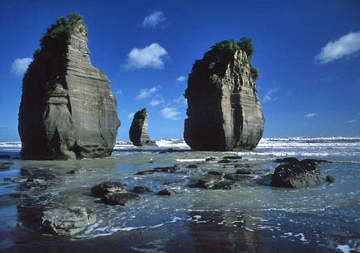 In New Zealand, King Country electricity users are waging a war of words against a lines company that has hiked its charges. Line companies do not charge for power – which is supplied by another organisation, but simply have a monopoly on the power lines in this far-flung outlying area on New Zealand’s West Coast.
In New Zealand, King Country electricity users are waging a war of words against a lines company that has hiked its charges. Line companies do not charge for power – which is supplied by another organisation, but simply have a monopoly on the power lines in this far-flung outlying area on New Zealand’s West Coast.
Customers of a King Country electric lines company which has almost tripled some of its charges have taken out an advertising campaign accusing it of “public relations spin and b******t.”
Customers of The Lines Company (TLC), which services 20,000 homes, farms and businesses from Otorohanga to Ohakune, are being asked to forward complaints to the Electricity and Gas Commissioner after changes were made to TLC’s pricing plan last year.
Consumers are charged a monthly rate based on the highest three hours of usage over a year.
Some businesses face increases of up to 300 per cent, claiming the charges are crippling them to the point of closing their doors.
TLC is the only lines company in the region and issues customers a monthly bill which is separate to their electricity bill. It is not unusual for the monthly lines charge to be higher than the power bill.
Tongariro Holiday Park owners Greg and Donna Hooper said they were facing a 200 per cent increase in their lines charges.
The couple were currently paying about $1100 a month in lines charges or $13,200 a year.
Under peak pricing, their bill would head toward $30,000 a year, she said.
“They (TLC) cover such a huge rural area, the whole area is being held to ransom.”
The Hoopers are considering moving to diesel generators but are concerned about what it would do to their Quality Mark rating which now had a “green” component linked to it.
Mrs Hooper said it defied belief the electricity was being generated from hydro dams almost on their doorstep, but they paid such huge prices.
Electricity and Gas Commissioner Judi Jones said TLC was the only company with charges based on peak rates and the only company sending bills directly to its customers.
She could not name individual companies she’d received complaints about, but agreed customers had no other option than to use TLC or switch to generators or other methods off the grid.
“It’s a natural monopoly,” she said.
The Commerce Commission and the Electricity Authority confirmed they had received complaints about the company but both said their acts did not cover the consumers’ complaints.
In the past week a consumer group has been running adverts in community newspapers accusing the company of inconsistency in charging, overcharging and “public relations spin” and “b******t.”
The group, headed by David Holland, has also forwarded a letter of complaint to the Government’s tourism, energy and commerce ministers.
“Something needs to be done. Someone has to take notice of this,” he said.
TLC chief executive John Anderson said the company covered rugged areas which meant long lines had to be laid often for a small number of customers.
He said the company’s pricing plan was established so residential customers, who lived in the area all year, did not end up paying for business customers whose usage was linked to the seasonal flow of tourists in the area.
He said whether charging a single peak rate was valid was being reviewed.
TLC’s 2010 annual report said the company made an after-tax profit of $6.06 million – a 50 per cent increase on 2009.
“Our profits were according to the Commerce Commission requirements. It’s out of those profit levels we fund our network,” Mr Anderson said.
He said the company was working with individual businesses. Those who had difficulty paying the monthly charges had their bills on hold while they reassessed how to manage their usage.
Ohakune business owner Alan Nation faces closing his laundromat this winter because of TLC’s charges.
“During summer we don’t make any money out of it but the charges are uniform across the year. Normally our power bill is about $180 a month but our lines charges are $360 a month. We’re struggling.”
He said TLC had told him he should shut during the peak period in winter if he wanted to impact on the overall line charges.
“They want me to shut between 5.30pm and 8pm when everyone is coming off the mountain and wants to use the laundromat.”
He said he complained to the Commerce Commission.
Gayle Richardson and Denton Beuth, who own River Lodge in Ohakune, said their bill was going to increase by 400 per cent.
“It was an increase of about $5000 a year. It went from $1500 to nearly $6000,” Ms Richardson said.
The couple appealed and TLC reduced it to $3900.
The lodge operates five rooms.
